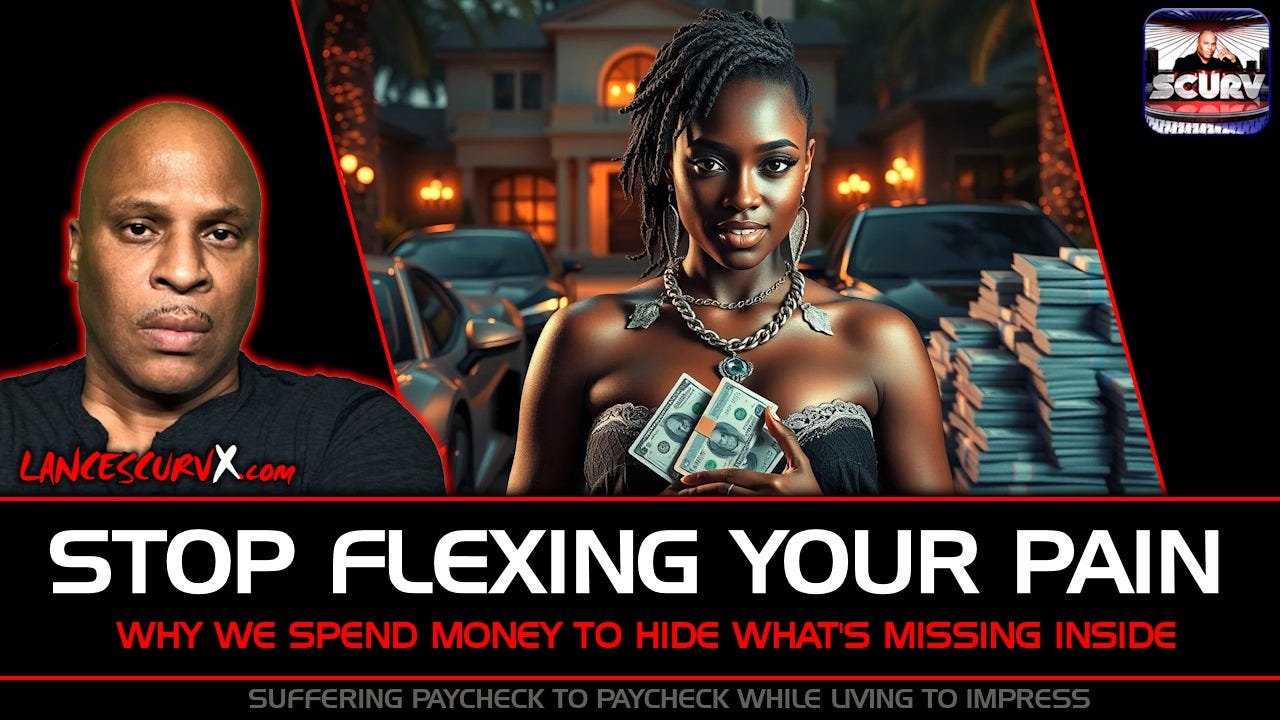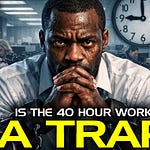There is a kind of man you see everywhere now — I see him on the block, at the corner store, in the church parking lot, and on the social media feed. He looks successful on paper: a house with rooms he never uses, a shiny car in the driveway with a note that says “payments,” a closet full of labels. From the outside he is loud and impressive. Inside he is counting down to the next check. Every month finishes the same way: waiting for the next paycheck to refill the life that drains faster than he can pour into it.
I grew up watching too many of us spend like we were trying to prove something to the world and to each other. New car, new chain, new everything — the receipts became like medals and badges of honor. We wear wealth on our sleeves because somewhere deep down we were taught to earn acceptance by display. That lesson goes back too far to be simple. It sits heavy in our bones. We spend to say we made it. We spend to block out a feeling that we are less than. We spend not only for ourselves but to show the world and one another that we aren’t the people history tried to make us.
But look closer: those things do not free you. They bind you. I have seen men who look like winners fall apart the moment life throws a hard left — a layoff, a hospital bill, a divorce. The man whose identity is built of props will discover the props were rented, not owned. The bigger the house, the longer the paperwork. The newer the car, the higher the payments. The more you chase the image, the less room you have to breathe, to think, to be honest with yourself.
There is another way. I know men who live small on purpose. They might drive an old car. They might rent. They might not, on the surface, look like they climbed the ladder. But they sleep at night. Their bills are light. Their time is heavy with possibilities. They have space to learn, to build something for themselves, to stop and think. That freedom is quiet and it is powerful. It is the kind of living that lets a man say no without fear. It is the kind of living that lets you choose your life instead of renting it from credit and applause.
If you want to be dangerous in a world that depends on your dependence, then stop letting lifestyle own you. Living below your means is not charity or shame. It is a tool. It is a way to get leverage without having to flash it. It means protecting your heart, your family, and your future by refusing to make every dollar a billboard. It means deciding what you want to keep and what you let go — and keeping the things that actually grow you, not the things that only make you showy.
We were trained to prove ourselves. That training came from the worst lessons: to mask pain with shine, to answer disrespect with display. Slavery’s shadow taught generations to survive by performing worth — to be acceptable in someone else’s eyes, to be “good enough” by someone else’s standard. So when a man grabs a new car or a big chain, sometimes he is not just buying metal and paint; he is buying a moment of relief from a lifetime of looking over his shoulder. I get that. I lived that pressure. But the truth is that buying into that moment too often costs you everything that matters later.
When I watch people buy things that hurt others — buying into industries that exploit workers, dropping money on labels that profit off our own pain — I see a cycle of self-oppression. We feed systems that make us feel we need to prove ourselves. We spend to lift our image and end up propping up the very markets that keep us insecure. That’s a hard pill to swallow, but it’s true: sometimes our spending is not freedom. It bankrolls an appearance, and that appearance keeps the old structures alive.
There is a ledger we must write. I do it out loud now because I want you to try it with me. Take paper and list every cost of the life you think you need — not the life you want when nobody’s watching, but the one you keep to keep face. Food, shelter, transport, health — fine. Now add the upgrades: car payments, brand clothes, restaurant habits, subscriptions you hardly use, the weekend events you attend because being seen matters more than rest. Look at the total. See how much of your month is spent not on living but on performing.
The first freedom you get when you cut that mess down is time. Time is the quiet capital nobody talks about. With lighter bills you can say no to late shifts, no to jobs that eat your soul, no to people who only want to be seen with you. You get runway — the chance to try something small that could grow into something real. Start a project that belongs to you. Learn a skill that keeps your mind sharp. Build something your name can stand behind when every label fades.
The second freedom is dignity. Not the kind that comes from a chain or a name, but the kind that comes from knowing you can handle hard times without collapsing your whole household. Real dignity is being able to stand in front of your kids and say, “I chose this life for us.” It’s showing up when it counts, not showing off when it doesn’t. That sense of self does not need a logo to be true. It grows in the small, stubborn choices you make when no one’s watching.
The third is the power to change your game. When expenses are low you can pivot. You can quit a job that drains you. You can take a course, try a side hustle, or open the door to something different without the fear that everything will fall apart. That kind of flexibility turns you from a performer into a player — someone who makes moves instead of reacting to them. That is how real wealth builds: slowly, quietly, over years of thoughtful choices.
I am not preaching poverty. I am talking about purpose. A simplified life without direction is just boredom that will find new ways to spend itself. If you cut the costume off but leave the emptiness, you will fill it with something else to impress with. So when you give yourself more time, name what you will do with it. Learn. Teach. Build. Plant. Invest in things that compound — skill, health, close relationships, projects that outlast trends.
Let me be blunt: sacrifices will sting at first. You will disappoint people. You will be judged. That is part of the price. But remember this: the discomfort of disappointing others is temporary; the exhaustion of living above your means is forever until you stop it. If you cannot survive the small sting of saying no now, you will never survive the long burn of maintaining a life built on other people’s applause. I chose the sting. I chose to appear less for a while so I could be more for the rest of my life.
Choose a circle that values you for what you bring, not for what you wear. Trim relationships that demand purchases as proof of loyalty. Spend time with friends who talk about work, books, and plans — not receipts. Your environment shapes your spending more than your budget ever will. Put distance between you and the people who make you feel smaller unless you buy something new. That distance is not abandonment; it is protection.
You will lose the easy praise. Fewer people will clap when you show up. At first, that silence can feel like loss. But silence reveals what’s real. The people who stay will be the ones who respect the man who chooses depth over display. Those relationships are where real riches live — not in followers or in the shallow nods that your purchases earn you.
I am asking you to be brave enough to look poor for a while so you can be powerful later. Brave enough to choose clarity over noise. Brave enough to refuse spending that punishes your future for a momentary fix. The life you save for yourself and your family by living below your means becomes a legacy no chain can buy.
I don’t want you to mishear me — this is not about shame for what you own. It is about honesty. Ask yourself: does this thing help me live the life I want, or does it help me play a role for people who will never carry me when I’m down? If the answer is the second, then it is time to say goodbye to the prop and hello to the work.
In the end, the real wealth is the quiet stuff: time to think, courage to leave, space to breathe, and dignity that doesn’t require a showroom. When you stop spending to impress others, you begin to spend on the things that matter — health, learning, building, love. You buy back your life. You buy back your future. You stop being the man who performs and start being the man who leads.
So do the work. Write the ledger. Cut the costs that exist only to prove something to people who won’t stand with you in hard times. Reclaim your time. Build in secret. Put your energy into things that last. Some will laugh. Some will judge. That is fine. You will be free.
If you want to be remembered, build what lasts. If you want to be unbreakable, learn to live with less until your life is worth more than the applause. Live below your means and above their expectations. Your life will thank you.













